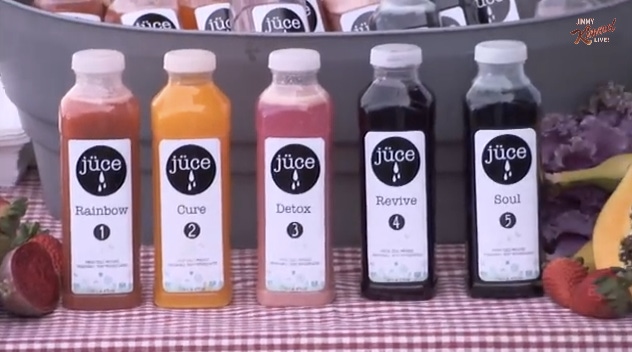Jimmy Kimmel's 'Lie Witness News' teaches us some lessons about the cold-pressed juice trend (really).

Any food product that makes inflated health claims is ripe for ridicule—especially when said product is ultra-expensive and boasts hipster cool-cred. For instance, remember when carrying a Starbucks coffee cup was a status symbol for the people crazy enough to spend $5 on “artisan” lattes? (This was, of course, before everyone discovered that Starbucks has a public bathroom.)
Those who buy cold-pressed, raw and organic juices—which often sell for upwards of $8 to $10—were a prime target for Jimmy Kimmel’s recent ‘Lie Witness News’ segment.
Kimmel and his team created a fake raw juice company called Jüce, and interviewed taste-testers at a farmers market. The hitch: rather than using fresh fruits and vegetables, Kimmel’s team instead bottled blended Fun Dip, Tang (wait, they still sell this?), Skittles and even melted Creamsicles with water, and gave each flavor a healthy-sounding name including “Cure," “Detox," “Soul," “Revive” and “Rainbow” (the Skittle one).
The price of such natural beverage delicacies? $19 per bottle. Hilariously, shoppers gave every product rave reviews and told the interviewer that Jüce tasted natural and healthy—with no chemical aftertaste.
Watch the segment here:
It’s easy to poke fun at any group who pays or cares more for products than deemed “normal” by the rest of the world. (Check out Kimmel’s other 'Lie Witness News' segments that lampoon fashionistas, music mavens, coffee aficianados, and Beliebers to see what I'm talking about.) But aside from hoping that if I taste-tested these candy concoctions my finely honed palate (hah) could discern the difference between organic produce and Skittles, this Kimmel experiment has some useful takeaways.
First, marketing and branding are key to product success. Note that Jüce has sleek packaging that hints at the possible goodness inside. A clean, black and white label implies the beverage contains similarly clean ingredients; numbers give it that detox-y, I’m-on-a-juice-cleanse vibe. Taste-testers expected the product to taste a certain way even before they sampled it.
Second, we deduce that real HPP juices are way too sugary. We knew this already, of course. Evolution Fresh Cold-Pressed Apple Berry, for example, contains 48 grams of sugar per 15-ounce bottle (technically two servings). Yes, it’s all from nutritious fruits like mango, strawberries, banana, apples and more, but that’s more sugar than a 12-ounce can of coke, which has 39 grams.
If dissolved Fun Dip can be mistaken for a fresh, cold-pressed juice, maybe it's the juice that should change.
About the Author(s)
You May Also Like




